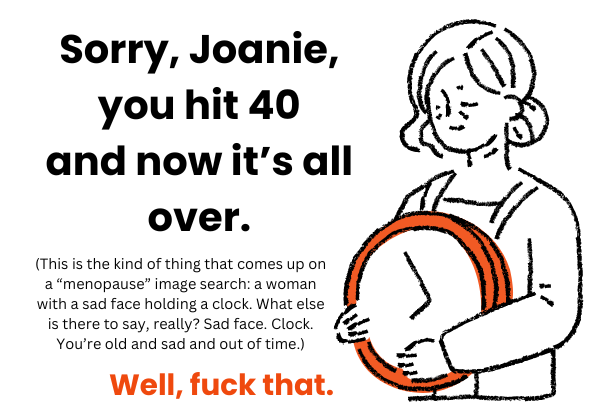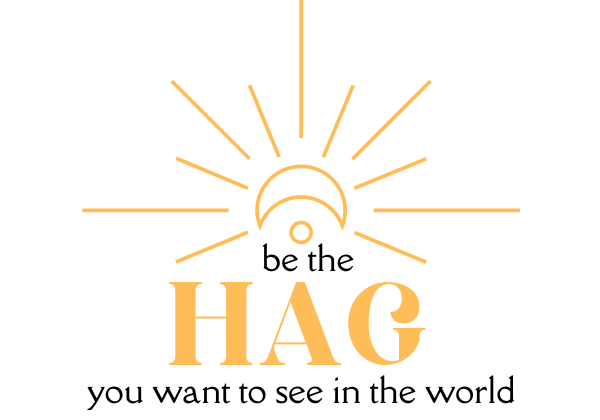Aging, Yes...
...but advancing (and agitating and accepting and probably also arguing)
The word "hag" has some baggage attached to it. Ugly, mean, demonic. And, inevitably, old.
Some of those same words get applied to women outside of myths—once, that is, they've crossed the imaginary line demarcating a woman's state of either desirability or invisibility in our society. (Sometimes this line is drawn at thirty; sometimes it's forty. In Hollywood, I gather, it's conceivable for a twenty-eight-year-old woman to play the mother of a forty-two-year-old man. Strange are the ways of the patriarchy, I guess?)
Wherever that line fell for me, I'm inarguably on the side of being invisible instead of desirable at this point. I'm part of generation Oregon Trail (see: Xennial, geriatric millennial), and these days I've been thinking—incessantly—about what it means to be in the second half of my life. So have my friends.
If I were to make a word cloud of our thoughts, the term perimenopause would be huge. It'd be surrounded by concepts such as: deflated career expectations, why '90s fashion, motherhood, patriarchy, anxiety, mental load, back pain, emotional energy, and diet culture.
This all takes up a ton of brain space, and I wanted to create a place to discuss this stuff—to encourage further conversation about it.
Thus: Hag. A newsletter to explore and share and celebrate (and commiserate and investigate and contemplate) both the process of becoming and the act of being an older woman, whatever that means to you.
I'd love to get to a point where women stop feeling isolated and abnormal and alone when what they're dealing with is actually widespread and in desperate need of a spotlight. For example: Two of my friends in their forties recently told me that, before I'd started complaining about my various perimenopausal symptoms, they'd never heard of perimenopause at all. Which is like… What?
I've done menarche. I've experienced pregnancy. But I've never felt less supported than I do heading into menopause. Most of us who go through it (whether on our body's schedule or one that's induced) are embarking on this road to our next destination without much of a map. Medicine has mostly ignored us, leaving a troubling dearth of subject-relevant research.
Still, there are people who are traveling the same path. Normalizing conversation about the journey is important.
And it is a journey—not a frantic effort to run in place. By that I mean: Let's accept that aging can mean progress and growth. Stagnancy isn't a great goal; don't cling to the idea that your value and relevance and sense of self-worth are tied to prolonging your stay in the land of youth.
The first time I heard "forty is the new thirty," I kinda liked it. It said to me that getting older as a woman didn't have to mean I would be relegated to the status of unwanted and undesirable once I had a few gray hairs.
But I was looking at it all wrong.
I turned forty in 2020, just as the pandemic took hold. Schools closed. Businesses shuttered. Zoom mullets became the new power suits. The usual markers of a milestone birthday felt far away.
By 2023, though, lots of the old social pressures were once again ascendant. Many of us had emerged from the days of deliberate isolation with strange haircuts, a refusal to wear restrictive pants, and astonishingly detailed knowledge of sourdough starters. Soon, however, salons had smoothed out the eccentric hairstyles, fashion had found a way to shame away those sweatpants, and bakeries had resumed their sourdough supremacy.
And I finally had to figure out what it actually meant to be a woman in the second half of life—I felt like a junior member of the "She Looks Good…For Her Age" club (senior membership dependent, of course, on reaching the Last Fuckable Day).
I also got a lot of advice: age is just a number (…I mean, that's not not true); your forties are the last decade of trying new sports and not injuring yourself (ominous but good to know, I guess?); your kids will keep you young (ah, yes, the youth-ifying effects of telling someone to brush their teeth fifty times in one evening).
One piece of wisdom came up more often than any other, delivered as a hard-learned truth instead of optimistic posturing.
You don't have to give a fuck what other people think anymore.
I heard this exclusively from women. Women who felt free for the first time in their lives to wear what made them feel good; to exercise for health rather than to fit into a specific clothing size; to pursue pastimes purely for their own enjoyment.
And, maybe most radically, to be ignored by the formerly omnipresent male gaze and understand why that could be liberating rather than demoralizing. These women weren't trying to extend their time in an old era: They understood that they'd entered a new one.
I'd been looking at this stage of life (and everything that comes after) as something to stave off or rebrand. But forty's forty. It's the start of something, not a cryogenically frozen thirty.
In fact, I've started to think of the whole process of Life less as:
Part I: Youth and All Its Glories
Part II: Making the Best of the Years You Have Left
and more as:
Phase I: Childhood
Phase II: Learning to Be an Adult
Phase III: Putting It All Together
Or, as people in the past might have put it: Maiden, Mother, and Crone. I don't love the associations with all those words, but I do feel a kinship with the crone, the hag, the beldam of myth and legend. The wise woman, the solitary forest-dweller (because, for real, women are tired and sometimes being alone in the woods sounds fucking amazing), the woman who defies her restrictive societal role.
I'm not drying up and lying low and apologizing for having lived this long. The word hag might be an insult, but it doesn't get applied to the callow and inexperienced. Being a hag means you've put in the time and you've earned the experience. You've embraced (or at least tried to reckon with) what it means to be a woman who is past the age where youthful fertility—or the appearance of it—is your biggest value in society's eyes.
Perimenopause is a shitshow in a lot of ways, sure. I'm still in the foothills of the mountains of menopause and I can't say I've hugely enjoyed the scenery thus far. But is any major shift entirely comfortable? Certainly change is essential to growth.
Being a hag is about accepting but also advancing. It's about understanding where you are now and where you're going—without judging yourself and without demanding perpetual happiness.
It's about acknowledging that wisdom comes from decades of wear and tear, about advocating for more awareness about your own health and the health of the women around you. It's about exploring the ways your changing body can surprise and delight you still.
It's about finding new ways to think, feel, and be. We're not fading away. We're not shriveling up. We're rediscovering and rejuvenating ourselves and, yeah, probably complaining a little about the less-than-perfect situations we encounter along the way.
Because expecting perfection is boring and naïve—and we hags are neither.
Yours in charm & vigor,
That Hag
And Now…
Two Kindnesses to Practice in the Week Ahead:
1. Take a break for five fucking minutes. You're busy, true. It might feel impossible to get a minute alone. Still. Go into a room alone or somewhere private. Shut the door if you can. Take five big, deep, expansive breaths. In and out. Now stay there for a few more minutes and feel how nice it is to just breathe, to let your lungs do their amazing work. The world outside your fantastic lungs can wait.
2. Think of a time when you laughed so hard you forgot about what you looked like. Smile and feel the lightness of that memory lift you. If this memory involves you visiting terrible justice upon your enemies, that's fine. No judgment. You're really just looking to get the feel-good sensations involved in smiling.



